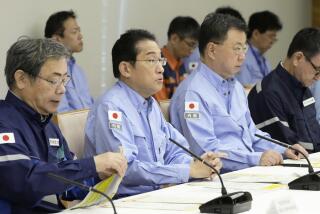Murayama Won’t Quit Despite Criticism Over Quake : Recovery: Japan’s prime minister says he will stay on in his post to help rebuild the damaged Kobe region.
- Share via
TOKYO — Prime Minister Tomiichi Murayama said Thursday that he “gravely” accepts political responsibility for the “sacrifice of more than 5,000 lives” in the Kobe earthquake, but he will remain in office to rebuild the devastated area and make Japan “a nation that is strong against disasters.”
Murayama made the comments in a special news conference about recovery measures his government is taking to “give people hope for the future.”
The 70-year-old prime minister said he is aware of criticism of his initial handling of the crisis. But, when asked whether he would resign, he insisted that working to rehabilitate the quake areas “constitutes the responsibility given me now.”
After dodging two additional questions about taking “political responsibility”--a euphemism for resigning--Murayama added that he has a duty to revamp national disaster plans.
Reports that Murayama might resign, perhaps after a series of budget measures are passed, recently have spread through the capital.
Even though expressways and rail lines were crippled and more than 107,000 buildings were destroyed or damaged beyond use, Murayama deployed only 16,000 Self-Defense Forces troops to the disaster area--and only 2,000 of them on Jan. 17, the day the 6.8-magnitude quake struck.
Murayama said the inability of his office to obtain accurate information speedily about the scope of the disaster showed that Japan needs to establish “a sweeping crisis management structure.”
He said he expects a Cabinet team to determine what is needed by next week. And he pledged to revamp Japan’s anti-disaster plans and training programs.
But on the big questions of how much his government is prepared to spend to rehabilitate the Kobe area and when the port city of 1.5 million people can expect recovery, Murayama said only that he is establishing two more committees. They will work with local governments to hammer out a master plan, he said.
He also refused to comment on damages to the area, which have been estimated at $100 billion.
The annual summit of the 18 leaders of the Asia-Pacific Economic Cooperation organization, planned for neighboring Osaka in November, will be held as scheduled, Murayama confirmed. President Clinton is expected to attend.
Murayama also said he has boosted the number of rent-free temporary housing units the government will provide by 10,000 to 40,000. More than 90,000 families have applied for the units.
Other government measures he mentioned included 2.5% loans requiring no collateral for small-business people; subsidies for wages of workers at damaged or destroyed enterprises, and tax reductions for individuals and companies.
*
On funding government rehabilitation projects, the prime minister said only that he would not move up the implementation of a planned 2% increase in the nation’s consumption tax. The tax is scheduled to be raised to 5% in 1997.
The first governmental rehabilitation package will be submitted to Parliament on Feb. 24 in the form of a supplementary 1994 budget, he said. Total spending, however, won’t become clear until a supplementary 1995 budget is formed later. Fiscal year 1994 ends March 31, and fiscal 1995 begins April 1.
The most hopeful news was that water service is expected to be fully restored in the disaster area by Feb. 20. But gas is expected to remain out of service until mid-March.
City authorities in Kobe announced yet another measure to reduce traffic that has clogged roads since the earthquake struck. After traffic jams hampered delivery of relief goods in the first four days, police restricted vehicles on major highways through the city to drivers holding emergency passes. However, they issued so many passes--179,000--that congestion continued, hindering removal of garbage and debris.
Pass-holders must reapply for new stickers to be issued under more stringent conditions beginning Feb. 19, police said.
A nationwide lottery will be held in April to raise an estimated $90 million for rehabilitation of the disaster area. Private fund-raising activities have already brought in more than $450 million.
But the first attempts to distribute the funds have already run into bureaucratic snarls.
Under rules fixed by a national committee handling the private donations, a quake victim is entitled to a $1,000 payment per household only if more than 50% of the victim’s home was destroyed. Victims with less damage get nothing.
More to Read
Sign up for Essential California
The most important California stories and recommendations in your inbox every morning.
You may occasionally receive promotional content from the Los Angeles Times.













